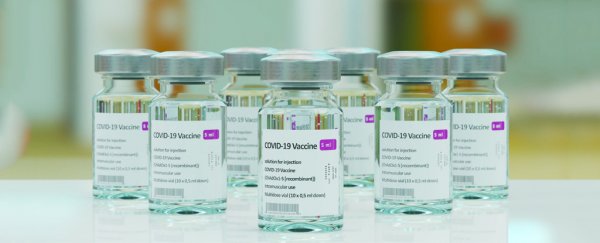Although vaccines work well against the Delta variant, the level of protection they offer seems to depend largely on whether you've completed your vaccination course.
A study published Thursday in the journal Nature found that just a single dose of Pfizer's or AstraZeneca's vaccines – both of which require two shots – was either weakly or not at all effective against Delta.
The researchers performed laboratory experiments on blood samples from people who had received one of those shots. After a single dose, just 10 percent of those samples had developed antibodies that neutralized the Delta variant – a sign that those individuals would be protected from a symptomatic infection. After two doses, however, 95 percent of samples had developed neutralizing antibodies against Delta.
The researchers concluded that the Delta variant "partially but significantly escapes" immune protection from vaccines.
While the results of laboratory experiments like these don't necessarily translate directly to the real world, other studies have similarly shown that Delta resists protection from one vaccine dose.
A UK analysis in May found that a single dose of either Pfizer's or AstraZeneca's vaccine was just 33 percent effective against symptomatic COVID-19 caused by Delta. After two doses, that efficacy rose to 88 percent for Pfizer's vaccine and 60 percent for AstraZeneca's.
Two doses of Pfizer's vaccine were also 96 percent effective at preventing hospitalizations from Delta cases, while two doses of AstraZeneca's vaccine were around 92 percent effective by the same standard.
Meanwhile, a Canadian study that's still awaiting peer review found that a single dose of Pfizer's shot was 56 percent effective at preventing symptomatic infections caused by Delta after two weeks. That rate was 67 percent for AstraZeneca's shot and 72 percent for Moderna's.
When it came to preventing Delta-related hospitalizations, that efficacy rose to 78 percent for Pfizer, 88 percent for AstraZeneca, and 96 percent for Moderna.
The same study suggested that after two doses, Pfizer's vaccine was 87 percent effective against symptomatic infections caused by Delta. But the researchers didn't have enough data for AstraZeneca or Moderna.
Taken together, the studies suggest that partially vaccinated people may be more vulnerable to symptomatic COVID-19 cases now than in months past, since Delta has become the dominant strain in many countries, including the UK and US. Around 48 percent of the US population is fully vaccinated, while 55 percent has received at least one dose.
But in some states, the gap between people who've gotten one shot and those who've completed the course is wider than the national average. Arkansas' state health director, Dr. José Romero, told Insider that 15 percent of people there who had received their first dose of either Pfizer's or Moderna's vaccine hadn't returned for their second as of two weeks ago.
In many cases, Romero said, people were deterred by the initial side effects.
"We have a significant proportion of individuals that receive one dose of a two-dose series but don't go back for the second dose within the window, or within 42 days after that vaccine," he said. "They don't have the full protection that they should have."
This article was originally published by Business Insider.
More from Business Insider:
